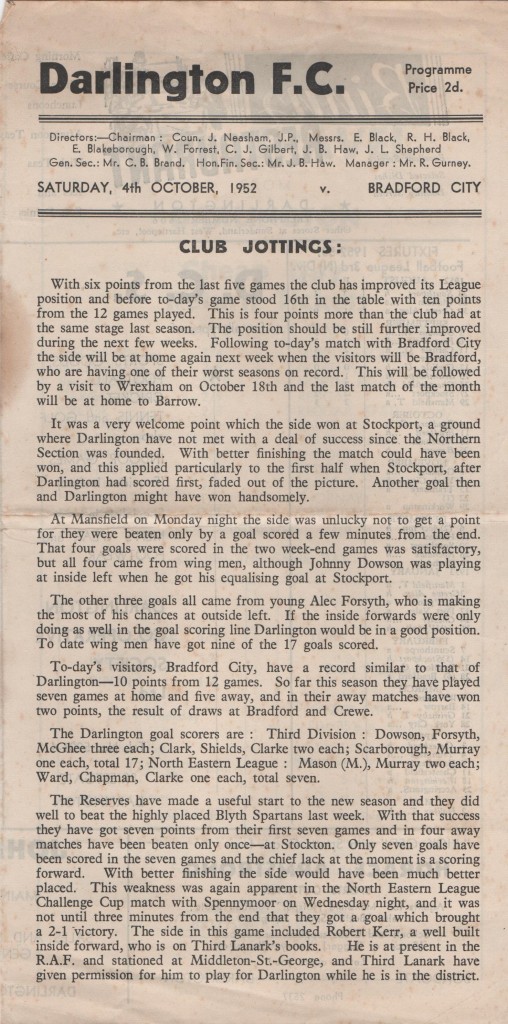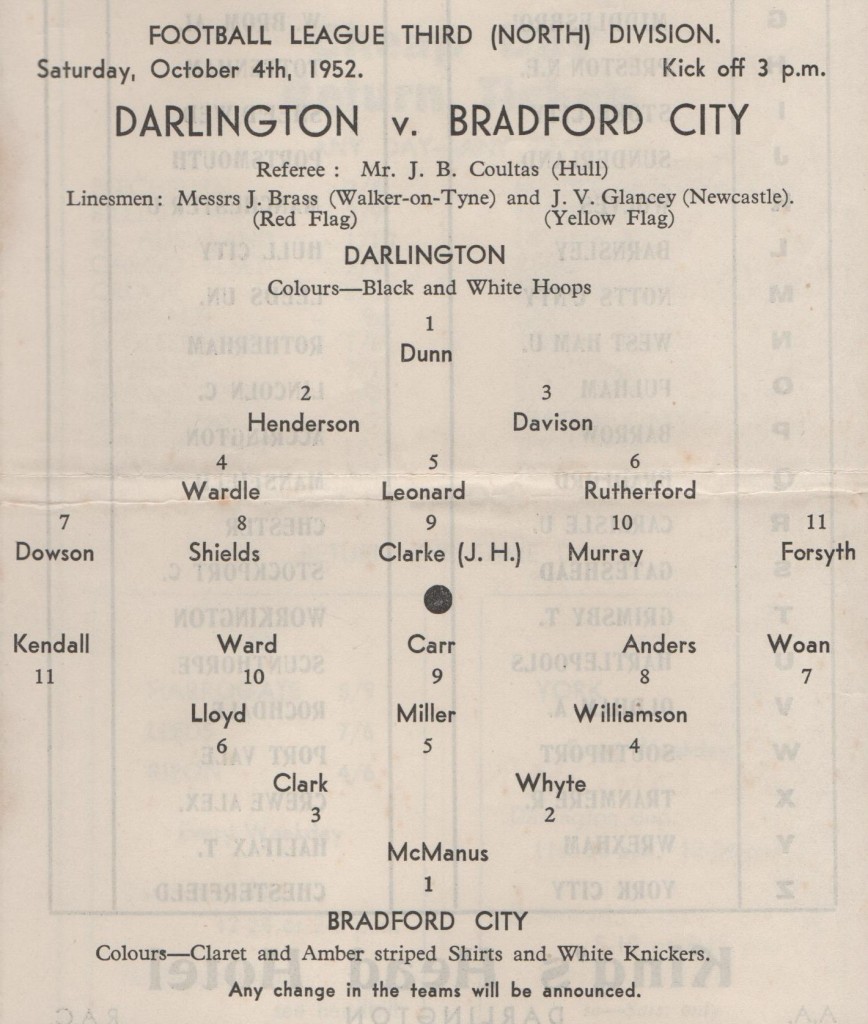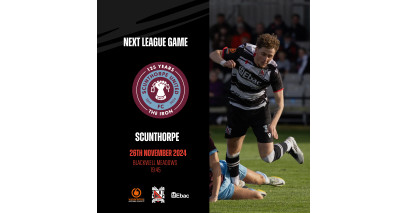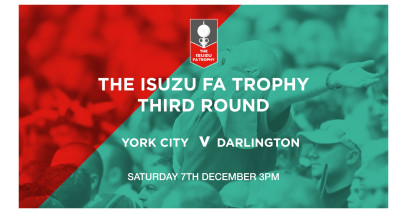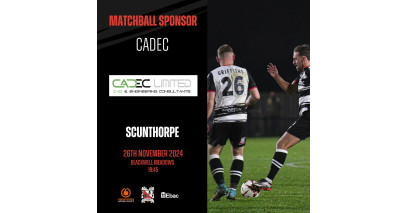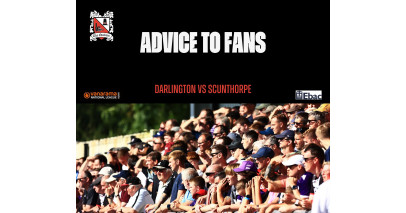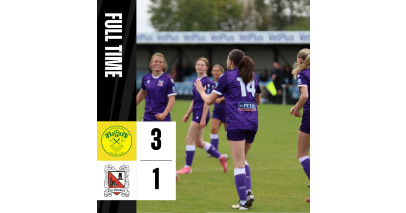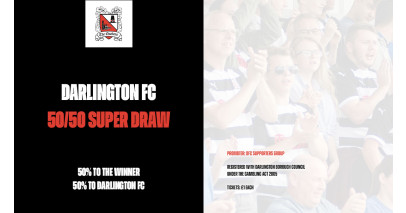Memory match Bradford City 1952
By Ray Simpson
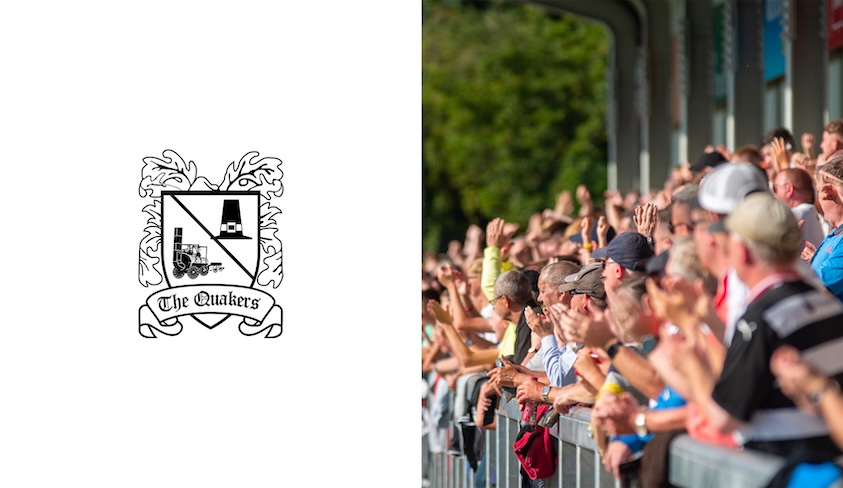
Simon Weatherill continues his Memory Match series with the home game against Bradford City on 4th O...
Darlington manager Bob Gurney spent the summer of 1952 making wholesale changes to his squad in an effort to improve their poor showing of the previous campaign. The Quakers had finished second bottom of Division 3 North and had to apply for re-election for the third time in the club’s history. They were safely re-elected at the League AGM with 49 votes, ahead of Workington with 40 votes and the two representatives from the Southern section, Exeter (47 votes) and Walsall (45). There was no significant challenge from the non-league clubs with Wigan the leading contender, only polling 9 votes, but Gurney was determined that such a poor season would not be repeated. He made nine new signings, five from Scotland and four North Easterners. One of the new men who proved to be a significant signing for the club was Brian Henderson, who was signed on a free transfer from Carlisle United. He went on to make 463 appearances for the Quakers, placing him third behind Ron Greener and John Peverell in the list of all time appearances for the club. But it was talk of a possible tenth signing that had the supporters excited. The Quakers had offered Liverpool £5,000 for centre forward Albert Stubbins. Stubbins, who hailed from Wallsend, had starred for Newcastle United in his early career and had become a Liverpool legend after his move there in 1946. He had played 173 games for the Anfield club, scoring 83 goals, but by the summer of 1952, aged 33, he was coming to the end of his career. Manager Gurney was still on the lookout for a centre forward and saw Stubbins as the final piece in his team building jigsaw. The transfer never happened, but the very fact that the Quakers made an offer for such a high profile player showed that they meant business!
Gurney’s new look side didn’t start the season very well and five defeats from the first seven games saw them propping up the table by mid September. Results improved slightly so that by the time Bradford City visited Feethams on October 4th the Quakers had risen to 16th place in the table with 10 points from 12 games. Their opponents had an almost identical record and also had 10 points. The Quakers’ lack of success was put down to two major factors – a long injury list and a lack of a goal scoring centre forward. Centre half Denis Howe had only played three games at the start of the season before an injury put him out of action until December, and club captain Wilf Parsley only managed four games before he was forced into a long lay off.
In an attempt to solve the centre forward problem position, old Feethams favourite Harry Clarke was brought back for his third spell with the club. He’d originally joined the club during the war years and his goal scoring exploits earned him a £5,000 move to Leeds Utd in March 1947. He’d returned to Darlington nine months later before signing for Hartlepools in February 1949. He then drifted into non league football with Stockton before rejoining the Quakers to try and solve their problems in front of goal. The City game would be Clarke’s fourth appearance since re-signing. City would include their own new signing from Leyton Orient, Donald Woan, who’d signed for a “substantial four figure fee” the day before their visit to Feethams. Right winger Woan had previously played for Liverpool.
A crowd of 6,384 were at Feethams for the visit of Bradford City. They witnessed a dull and uninspiring game that seemed to be heading for a draw until a spectacular last eight minutes had the home fans purring with delight. The only real action of a drab first half saw Harry Clarke give the Quakers the lead in the 20th minute with a well taken goal. City equalised on 57 minutes through their diminutive inside left Whelan Ward. The home side were lucky to survive minutes later when centre forward Eddie Carr, the former Arsenal player, hit the upright with a header with goalkeeper Billy Dunn well beaten. Then, in the 82nd minute, the game suddenly burst into life. Clarke dribbled his way into the box through a packed City defence, where he was brought down. Joe Davison stepped forward and confidently scored Darlington’s first penalty award of the season. It proved to be the kick start that the Quakers needed.
Suddenly their fast, open forward play had the City defence in a hopeless tangle. They were particularly troubled down their right flank where the Darlington pairing of Alec Forsyth on the left wing and Ken Murray at inside left combined brilliantly in a purple patch that the visitors had no answer to. Within three minutes of the home side regaining the lead from the spot, both Forsyth and Murray had scored brilliant goals to put the Quakers 4-1 in front. There was still time for Murray to go close a further three times in the closing moments but there were no more goals and the match finished at 4-1. Clarke had led the home attack well, Wardle had got through a tremendous amount of work at right half, but it was the left sided pairing of Forsyth and Murray that took the main plaudits for their match winning performance.
The four goals against Bradford City meant that the Quakers had scored eleven goals in the four games since Clarke had come back into the side. Clarke had contributed three, while left winger Forsyth had scored four. The win briefly lifted the Quakers into 15th place in the table but then a run of eight defeats in their next nine games dropped the club to third from bottom, only three points clear of bottom club Accrington Stanley. The injury problems continued and Gurney never had the luxury of playing a settled side. Results remained inconsistent and the season turned into one long struggle at the wrong end of the table. They eventually finished safely in 21st place with 34 points. Clarke managed 14 appearances and scored 6 goals, which left him with club figures of 73 total appearances in three spells with the Quakers and an impressive total of 50 goals.
The programme for the 52/53 season consisted of a large single sheet of paper, measuring 15” x 10”, which was folded into three, effectively creating six pages. It was priced 2d and was printed by Mawers. The front page carried Club Jottings, which discussed what had been happening around the club. The inside spread of three pages gave the fixtures for the first team and the reserves (playing in the North Eastern League) and the team line ups, and the rear two pages consisted of the half time scoreboard and a full page advert for cheap rail travel.
Team v Bradford City : 1 Billy Dunn 2 Brian Henderson 3 Joe Davison 4 George Wardle 5 Chris Leonard 6 Bill Rutherford 7 John Dowson 8 Sam Shields 9 Harry Clarke 10 Ken Murray 11 Alec Forsyth.



